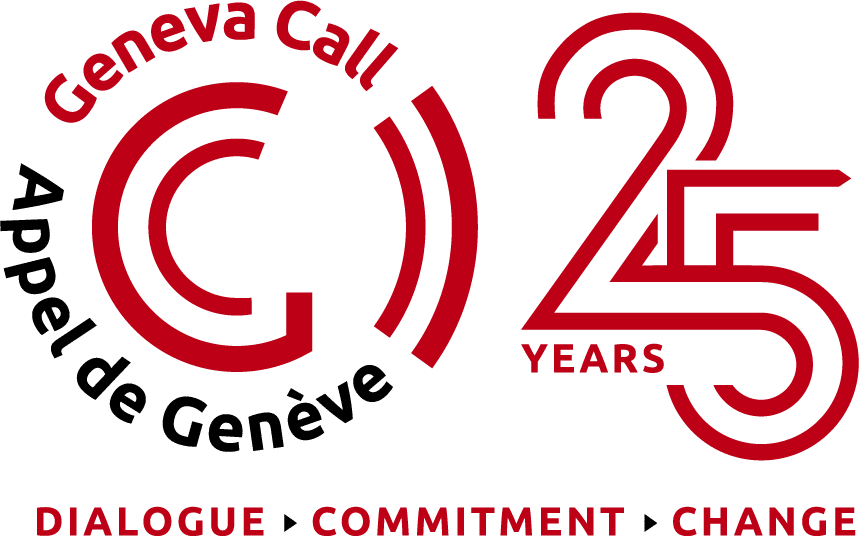
Story In Focus – Interview With Hichem Khadhraoui, Director of Operations
23 novembre 2021
Transcript of an interview carried out by Global Rights Compliance and published on November 22, 2021.
Please can you explain Geneva Call’s mission, and your role as Director of Operations at Geneva Call?
Geneva Call is a field-based, neutral, impartial and independent international humanitarian organisation with the unique mission to protect civilians by strengthening the respect of humanitarian norms by armed non-State actors. In order to promote the protection of civilians, Geneva Call uses a wide range of targeted and innovative tools among armed non-State actors, including Deed of Commitments.
As the Director of Operations, I provide strategic direction and oversight for the overall development of Geneva Call’s programs worldwide with a view to ensure that they effectively respond to the field needs, guide our staff security management system, and oversee the monitoring, review and evaluation of our operations.
During your time with Geneva Call, what trends and challenges have you witnessed related to ensuring compliance with International Humanitarian Law (IHL) and International Human Rights Law (IHRL) by armed non-State actors (ANSAs)?
Armed non-State actors are a major player in contemporary armed conflicts, hence the need to engage them with a view to foster compliance with IHL and IHRL. In our work, Geneva Call has identified three major challenges.
First, Geneva Call has observed an increasing trend for fragmentation and volatile alliances of ANSAs, coupled with longer, protracted armed conflicts. Developing a sustained humanitarian engagement with the aim to create long lasting behavioural change is more challenging when the internal structures of ANSAs are not stable or more horizontal. Therefore, it is crucial to engage not only the leadership of an ANSAs, but also other members as they could potentially belong to another ANSA in the future. However, this is not only a challenge, but also an opportunity. For example, when an ANSAs joins a broader umbrella alliance, they can open the door for the humanitarian engagement of other ANSAs in that alliance or exercise peer pressure to foster compliance.
Second, since 2014, against the background of the so-called foreign fighter phenomenon, Geneva Call has seen a new wave of counter-terrorism laws and policies that negatively affect humanitarian action, including the humanitarian engagement of ANSAs: some of these laws and policies potentially criminalise or de-legitimise the humanitarian engagement of ANSAs, including for the purpose of fostering their compliance with IHL and IHRL. This is particularly the case for ANSAs that are also designated terrorist groups.
Finally, an estimated 66 million peoples live in areas under the control of ANSAs where ANSAS exercise government functions, such as for example the administration of justice or the provision of education. Governance by ANSAs raises a different set of compliance challenges than for example the conduct of hostilities and is often linked to capacity and available resources. Similarly, some of the most consequential environmental impacts of armed conflict are observed in territories under the control of ANSAs, for example waste accumulation or unsafe exploitation of nature resources. Moreover, in our efforts to address climate change and environmental degradation more generally, we must ensure that our efforts include territories under the control of ANSAs. The humanitarian engagement of ANSAs is necessary to address all these issues.
In October 2021, a High-Level Event on action in support of preventing and ending famine was organised by OCHA, FAO and WFP. In your opinion, how does IHL mitigate hunger and prevent famine in armed conflict?
Famine is not the inevitable by-product of war, but occurs when basic principles of IHL are not respected. IHL is a tool to prevent famine and food insecurity.
Better respect of IHL obligations, such as the prohibition to attack, destroy, remove or otherwise render useless objects indispensable to the survival of the civilian population, such as food and foodstuff, contributes to address the root causes of famine in armed conflict. In addition, IHL also facilitates addressing famine and food insecurity by requesting parties to the conflict to allow and facilitate humanitarian assistance to those in need. This obligation is particularly important to protect the millions of civilians who have to rely on humanitarian relief in order to cover their basic needs. Finally, better respect for IHL more generally allows communities to access humanitarian relief in safety and reduces the need for such relief in the long term through the protection of infrastructure, local economies and livelihoods.
Through the latest Deed of Commitment on the Prevention of Starvation and Addressing Conflict-Related Food Insecurity Geneva Call offers ANSAs the opportunity to pledge to respect IHL and IHRL by preventing and mitigating food insecurity during armed conflict. What has been the motivation behind the innovative development of a Deed of Commitment on this thematic area?
As a field-based humanitarian organisation, Geneva Call has seen the devastating impact of food insecurity and famine for the civilian population, an impact that lasts long after fighting has stopped.
Millions of people are affected by famine and acute food insecurity. The new Deed of Commitment on the Prevention of Starvation and Addressing Conflict-Related Food Insecurity is our response to this pressing humanitarian issue.
For the development of this new Deed of Commitment we have consulted other relevant humanitarian organisations, such as WPF, OCHA, FAO, the ICRC, but also ANSAs. During these consultations, ANSAs highlighted two main concerns, namely water contamination and lack of access to safe water, and the destruction or contamination of agricultural fields. They highlighted that these concerns have long lasting reverberating effects and that they could see themselves playing a role to address these.
How do you envision the above tool’s contribution to efforts at the national and international level to prevent starvation and address conflict-related food insecurity, and what is your relationship, if any, to other mechanisms that engage with ANSAs and supervise their compliance with IHL and IHRL obligations relevant to the above thematic area?
The new Deed of Commitment will contribute to put into practice the international efforts to address famine and food insecurity in armed conflicts with the ultimate goal to alleviate human suffering. In particular, the Deed of Commitment includes a clear obligation for signatories to allow and facilitate humanitarian access and protect humanitarian workers. Geneva Call hopes that the deployment of this new tool will contribute to enable civilians to access humanitarian relief in safety.
More generally, the Deed of Commitment is an innovative mechanism for compliance that provides ANSAs with the opportunity to formally express their commitment to humanitarian norms and to take ownership of these norms. Taking ownership of norms is known to improve compliance.
Geneva Call coordinates with other humanitarian actors to ensure complementary in its actions, both on a field and headquarters level, for example OCHA or WFP for food security. Obviously, we also coordinate with the ICRC for our humanitarian engagement of ANSAs. Finally, at field level, we facilitate access negotiations and more generally provide advise on how to engage ANSAs.
Geneva Call, as a principled humanitarian actor, does not engage in a formal working relationship with sanctions mechanisms. As a neutral and impartial organisation, it is important that we are not being perceived by ANSAs and other actors as contributing to potential sanctions. However, whenever relevant, we are coordinating and exchanging on general information and trends.
Engaging with ANSAs on humanitarian norms appears to be a long-term effort for Geneva Call. What long-term outcomes would you like to see from this engagement, and what more could organisations like GRC do to achieve this?
Indeed, the humanitarian engagement of ANSAs is a sustained, long-term effort with the aim to create behavioural change. Only the change in behaviour of all parties to an armed conflict will lead to a better protection of the civilian population against the effects of armed conflict, including food insecurity and famine. For this reason, it is crucial that the humanitarian engagement of ANSAs remains possible, even when other tools, such as sanctions, are deployed. Other organisations, including GRC could be instrumental in achieving this objective by advocating for humanitarian exemptions in any kind of sanctions regime. Such humanitarian exemptions are also crucial to ensure that humanitarian actors are able to rapidly deliver much needed humanitarian assistance and do not negatively affect the population.
